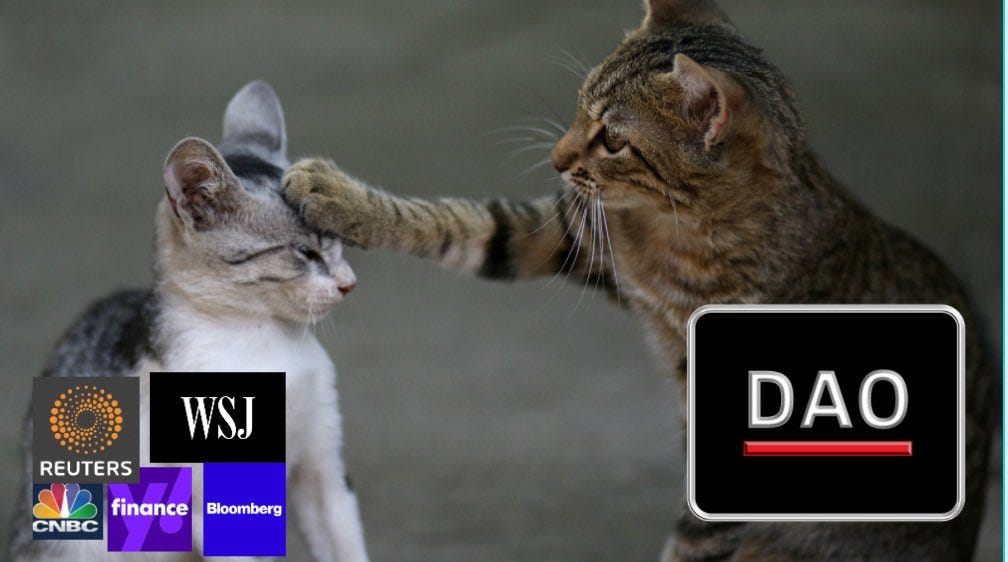This Week in DAOs - May 13, 2021
Bankless DAO hits its stride, Vitalik's UNI proposal, and Gitcoin dips into governance.
Each week - as part of Boardroom’s Stateless initiative - we publish two newsletters, in addition to longer forms of content when we have them:
“This Week in DAOs,” a summary of a handful of the top DAO and governance-related news stories each week; and
“Stateless Weekly,” a collection of the week’s best content about DAOs and distributed governance along with weekly governance updates for a growing number of projects.
Our goal is to build a community-driven resource covering digital and distributed organizations and their governance.
If you want to get involved, have feedback, or are interested in learning more about Boardroom, reply here or join our Discord - we’d love to hear from you.
📰 This Week’s News
Bankless DAO Takes Off

On May 4th, Bankless DAO launched as one of the first examples of a media brand leveraging its existing followers and community to bootstrap a DAO. And, so far, it’s been exciting to watch unfold.
Bankless DAO kicked off with a fair launch BANK distribution event in which 30% of BANK tokens were distributed retroactively to Bankless community members (badge holders, subscribers, etc.), 30% was designated to the Bankless DAO treasury, and 40% was designated to vest over time to the Bankless DAO treasury.
If you qualify, you can claim your BANK tokens here and use them to join the token-permissioned Discord and participate in the DAO’s governance.
Since its launch, Bankless DAO has been busy. The community has created its own Substack, its own Discord, its own governance forums, a Gitbook guide, and more.
The first action the DAO took was to pass the Genesis Proposal to compensate the Bankless LLC team with 250m BANK tokens (approx. 25% of the 30% designated to the DAO treasury), ensuring their continued contribution and leadership.
Second, they passed a proposal to donate $100k to Gitcoin, see the tweet, and the Snapshot vote that made it happen.
The other proposals being considered right now in the Bankless DAO governance forum include the creation of a writer’s guild, a media node system, a DAO museum, and plenty more.
The Bankless community is paving the way forward for a new DAO-based media organization. For more on why this is happening, check out Bankless co-founder David Hoffman’s piece:
It is a must-read look into why DAOs are going to be a force to be reckoned with in a variety of industries.
Vitalik’s UNI Pitch
UNI’s governance forum has been relatively quiet for the past few months, but that changed late Tuesday night when Vitalik Buterin posted there to make the case that UNI should become a price oracle for the decentralized finance (DeFi) ecosystem.
Oracles are essential to DeFi primitives like algorithmic stablecoins, collateralized loans, and synthetic assets, all of which rely on off-chain information (such as the price of USD, or other assets, in ETH) to function.
Central to Vitalik’s proposal is that UNI’s market cap is among the largest in crypto and thus the cost of attacking an oracle based on it would be prohibitively high, resulting in a more secure DeFi ecosystem.
Putting aside the proposal itself - which is interesting in its own right (we recommend reading the replies and discussion) - there is a bigger picture significance here worth highlighting.
As Vitalik mentions in the last section of his proposal, Ethereum itself is a base layer for an increasingly robust DeFi ecosystem, but also a blooming decentralized governance ecosystem. The latter phenomenon is a result of the “large need for public goods” (like price oracles) being pushed down to systems like Uniswap, rather than being concentrated in the base layer where ensuing “political conflicts over [the] addition of controversial features” can threaten the ecosystem as a whole.
This vision portends an increasing cross-project governance dialogue that will be truly fascinating to watch and participate in.
Gitcoin Governance?
Another Vitalik-related story this week was his sudden and massive donations to a few organizations. One of those organizations was Gitcoin, the Ethereum-focused public goods fundraising platform, which received 49,340,000,069,420 AKITA tokens, worth at one point nearly $500m (now worth $277m).
Crucially, however, these funds were not donated directly to Gitcoin the company, but rather Gitcoin’s community multi-sig which funds the matching pool for Gitcoin Grants.


Over the past couple of weeks, it seems Gitcoin has been laying the foundation for DAO-style governance over the Grants matching pool funds (and potentially more) Check out this hint… and this one:
On Gitcoin’s new governance forum, community members have been mulling the creation of a “stewards program.” Read more about it here.
Gitcoin has become a meta-public good for the Ethereum ecosystem as a venue for funding other public goods. Decentralizing governance of Gitcoin grants and increasing the “credible neutrality” of the platform is an honorable goal. We’ll be keeping up with how it unfolds.
Rari Capital’s Community Building
Rari Capital is a non-custodial DeFi project which describes itself as a “robo-advisor for maximizing yield.”
Last week, a hacker siphoned off 2,600 ETH from Rari users by exploiting a bug with the project’s integration with Alpha Finance Labs’ ibETH token. The loss equated to 60% of all users’ funds in the Rari Capital Ethereum Pool. For the full, technical post-mortem of what happened, read here.
The Rari Protocol, which is the technology behind Rari’s yield-generating products, is controlled by holders of $RGT, aka Rari Governance Tokens. The project conducted a fair launch liquidity mining program in October 2020. In December 2020, a Rari Improvement Proposal was approved updating the emissions schedule and allocating 2m $RGT tokens to grow the team and compensate contributors to the protocol, such as the founding Rari Capital team.
Rari Capital CEO Jai Bhavnani announced Sunday evening that the protocol contributors have decided to return the 2M $RGT tokens back to the Rari DAO to compensate those who lost funds in the hack.
This story is worth highlighting because it speaks to the sometimes messy reality of distributed organizations. Crypto and DeFi are new technologies and hacks like this are natural - yet not insignificant - growing pains. As was said in the above-linked post, “Countless protocols get hacked each year and it is a matter of how the community and the protocol [reacts] that determines the future of the project.”
In March, Vitalik (please excuse the third Vitalik reference this week… hard to avoid sometimes…) wrote a post called “The Most Important Scarce Resource is Legitimacy,” which discussed the concept of legitimacy within decentralized systems. It’s worth reading the post to grok a fuller definition, but legitimacy in this context is described as the invisible social force that bounds a system together: “legitimacy appears in any context where there is coordination, and especially on the internet, coordination is everywhere.”
The post goes on to discuss a non-exhaustive list of sources of legitimacy, such as brute force, continuity, fairness, process, performance, and participation.
What the Rari contributors decided to do to make up for their mistake is a great example of how to maintain the legitimacy of a project. Kudos to the team!
Stateless by Boardroom is a community-driven resource covering digital and distributed organizations and their governance. If you’re interested in contributing to Stateless, reply here or reach out to us on the Boardroom Discord.




